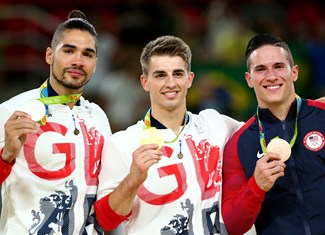With the Rio Olympics drawing to a close, we’ve taken some time to reflect on the behavioural insights that could be applied to this year’s games. What it means to an athlete to win a gold, silver or bronze medal; what factors might lead to a win; and the small changes that can make a big difference to an athlete’s training regime.
Would you be happier winning a bronze or silver medal?
Anyone who watched the expressions on the faces of gymnast Louis Smith or cyclist Mark Cavendish after their recent Olympic performances might have assumed that they had both failed spectacularly. In fact, they had done amazingly well to win Olympic medals. It was just that the colour of these medals was silver. Not gold.
Contrast that with the delight on the face of Sophie Hitchon, who claimed a bronze medal in the Hammer with a throw of over 74 metres. Or Tom Daley and Dan Goodfellow, the synchronised divers, who also claimed bronze having started training together less than 11 months ago.
Can it really be the case that some people end up being more satisfied overall after winning a bronze medal, than their higher-achieving team-mates? This was indeed the conclusion of a study that looked at the reactions of athletes winning silver and bronze medals at the Olympics. It found that those who ranked second tended to associate this with the ‘near-miss’ of a gold medal, while the bronze medalists were more likely to be relieved to be on the podium at all. While few of us will ever be Olympic medalists, we’ve all experienced a similar phenomenon when we miss a bus by one minute, as opposed to 20. Just missing the bus by a single minute makes it feel much more exasperating.
Source: rio2016.com
The science of losing
When Justin Rose earlier this week became the first Olympic golf gold medalist in over a century, it reminded us of one of our favourite sporting studies. The study looked at the scores of golfers on the PGA tour and it showed that golfers are unduly influenced by the reference point of ‘par’ per hole. Golfers who were under-par tended to have putts that were less accurate than those who are over par. In other words, golfers are loss averse and seem to invest more effort on a putt when it will enable them to avoid a loss.
Individuals are averse to losing in general but they are especially averse to coming in last place, a phenomenon known as last place aversion; i.e. individuals are inherently averse to being ranked last in competitions or social groupings. This appears to affect other species too; neurobiological studies in primates show that relative ranking within a group has a direct impact on their serotonin levels. For athletes, this may mean that individuals who are faced with the possibility of being ranked in last place are more likely to take bigger risks to move out of that bottom position.
Applying marginal gains to performance
Cycling enthusiasts are likely to have heard of Sir David Brailsford’s ‘marginal gains’ approach to performance – how an aggregation of small tweaks can have a big impact on sporting success. At this year’s games we’ve seen this at play in the new suits that the riders are wearing, the angles that bike seats are set at, and the preference for liquid handlebar chalk over gloves. Olympic legend Sir Chris Hoy even revealed that the cycling team is studying the effect of ice baths on cyclists’ performance, which recent studies seem to be showing might not be as effective as was once assumed.
The aggregation of marginal gains approach is very close to BIT’s heart. Since our inception, we have run hundreds of randomised evaluations that show the impact that small changes can have on government policy. Taken together, these small changes can lead to big effects.
And so we were delighted to see the approach being taken up across a range of other GB teams, who are paying much closer attention to every element of their athlete’s training programmes. For example, Chris Spice, performance director for Team GB Swimming, introduced a strict regime that has included a number of environmental tweaks – late night swims to adjust to time differences, special mattresses and blackout blinds to improve sleep quality and strict meal plans designed to enhance performance. Could these changes lie behind the team’s most successful spate of medals since 1908?





